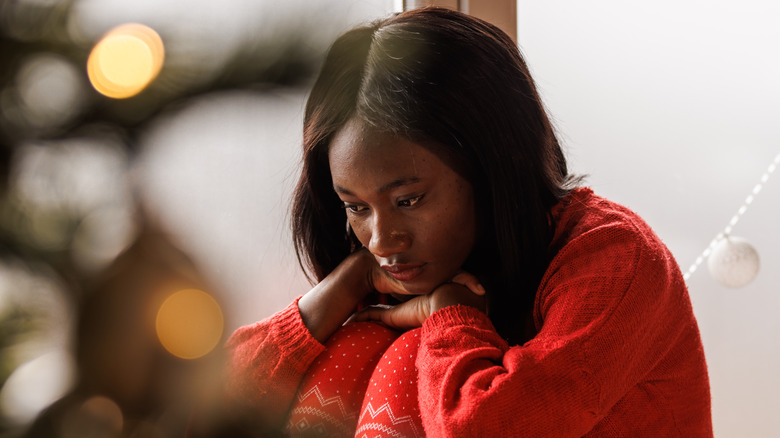Why You're More Likely To Have Nightmares During The Holiday Season
Falling snow, sweet treats, and gatherings with loved ones are all hallmark features of the end-of-the-year holiday season. While these gift-giving months may bring about joy, laughter, and gratitude for some, for others, it can prompt more difficult emotions ranging from stress to fear to grief. In some cases, these emotional states may play out in our dreams or, more likely, nightmares.
An inconsistent sleep schedule; the use of certain medications; or mental health issues, such as anxiety, stress, and post-traumatic stress disorder (PTSD) can all play a role in nightmares, explain experts from the American Academy of Sleep Medicine. While most often observed in young children, between 50% and 85% of adults are affected by nightmares every once in a while. Emotions frequently associated with nightmares include terror, rage, embarrassment, fear, disgust, and more. Usually occurring within the latter half of sleep, bad dreams are often characterized by feelings of impending danger. Nightmares specifically related to the holiday season, however, can have some interesting underlying meanings.
Nightmares may represent stress or fear during the holiday season
Dr. Kelly Bulkeley, author, religion psychologist, dream researcher, and director of the Sleep and Dream Database (SDDb) archives, wrote via Psychology Today about the different dreams people have around Christmas time. She noted that although these particular anecdotes pulled from the Sleep and Dream Database focus on Christianity-based holidays, holiday-related dreams are thought to be universal across religions.
Dr. Bulkeley explained that mild nightmares can be representative of the stress many of us feel around the holiday season. These types of dreams tend to be more realistic than fantastical in nature. Such examples include bad dreams about guests arriving late to a celebratory dinner, gifts being out of stock, getting lost in a crowded store, or an embarrassing blunder at a holiday party.
Sometimes, the holidays can rouse more terrifying nightmares representing our worst fears, Dr. Bulkeley added. In one anecdote pulled from the database, an individual describes seeing a skeleton in their bedroom donning a Santa hat. Another individual described a recurring nightmare of a looming Christmas tree adorned with colorful lights that becomes more threatening as it grows and whirls toward them. "Eventually I get sucked into the tree, and wake up in a sweat. To this day I use only white lights on my Christmas trees," the dreamer recalled. For some, however, bad dreams during the holidays aren't so much scary or stressful as they are painful.
Grief dreams tend to occur during the holidays
Known as "grief dreams," grief researcher Dr. Joshua Black explains that these kinds of dreams can take three forms. The first category of grief dreams are those that involve the concept of loss in a more abstract way, such as attempting to find a missing object. The second category is grief dreams in which a deceased loved one is referenced in some way, perhaps by another person in the dream. The third type of grief dreams an individual may have is one directly involving the deceased, in which the dreamer may see or hear the voice of the person. Those who have experienced a miscarriage or the death of a pet may also experience grief dreams.
During the holiday season, memories of a friend or family member who has passed away tend to resurface and may be reflected in our dreams (via Healthline). Dr. Black noted that negative grief dreams may indicate a person is experiencing anger, guilt, or trauma around a loved one's death. In these cases, the dream may involve the deceased speaking in a harsh or disapproving manner to the dreamer. However, not all grief dreams are unpleasant. For some, grief dreams can bring about feelings of peace. In these instances, the dreamer may witness their loved one waving, placing a reassuring hand on their shoulder, offering an encouraging word, or giving permission for the dreamer to let go of blame or other negative emotions. Regardless of the type of dream, each individual goes through different stages of grief.



